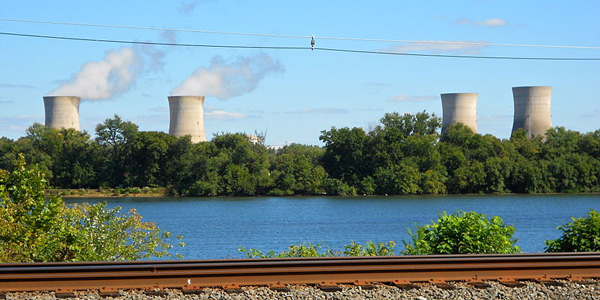By Christen Smith
It’s been nearly three weeks since Pennsylvania lawmakers proposed a $500 million plan to subsidize the state’s nuclear fleet, and hearings on the issue still appear to be weeks away.
The clock is ticking if lawmakers want to save Three Mile Island from shutting down in September. Exelon promised to begin the four-month deactivation process June 1, leaving legislators a small window of opportunity to intervene.
Rep. Thomas Mehaffie (R), whose district includes TMI, introduced House Bill 11 earlier this month as a way to “properly” value the zero-carbon energy nuclear plants provide. (See Pa. Lawmakers Unveil $500M Nuke Subsidy Bill.)
The plan places nuclear power in a newly created third tier in the state’s Alternative Energy Portfolio Standard (AEPS) Program, from which suppliers must buy 50% of their electricity. Should the state lose all five nuclear reactors, Mehaffie said taxpayers will foot an estimated $4.6 billion in costs, including: $788 million in higher electric prices; $2 billion in lost state GDP; and $1.86 billion in costs associated with carbon emissions and harmful criteria air pollutants, including SO2, NOX and particulate matter.
Mehaffie told RTO Insider on Wednesday that no amendments have been made to his bill, though he believes a hearing is scheduled in the House Consumer Affairs Committee sometime during the first half of April.
Committee Chairman Brad Roae (R) said in an email that an official schedule will be released soon. “This is a very complex and technical issue, and we are conducting hearings on the legislation to educate legislators so that we can make good decisions,” he said.
Asked if there’s any sense of urgency among lawmakers to move the bill, Roae did not respond.
The Associated Press last week reported that opposed lawmakers could throw their support behind a modified plan that includes environmental policies aimed at reducing carbon emissions or subsidizing renewable resources.
“The crisis is here and we need … to deal with it,” Rep. Carolyn Comitta (D) told the AP on March 22. “Even things we thought were problems in the past need to be part of the solution.”
Critics of the legislation argue the “bailout” prioritizes aging, expensive nuclear facilities at the expense of cheaper sources like natural gas and coal. Others insist the concept defies the purpose of PJM.
“By the end of this, the bill is going to be chock-full of handouts to grease the skids,” tweeted former Montana Public Service Commission Vice Chairman — and National Association of Regulatory Utility Commissioners President — Travis Kavulla, now director of energy and environmental policy at R Street Institute. “Begging the question: Why the hell should Pennsylvania pass a law because a single power plant is out of the money?”
Monitor Says PJM’s Capacity Market not Competitive.)
Meanwhile, State Sen. Ryan Aument (R) has yet to introduce his version of the bill. Chief of Staff Ryan Boop told RTO Insider on Wednesday the final language of the proposal is close to resolution, though he declined to say whether Aument’s version included the same elements of HB 11 or any concessions to sway critics.




